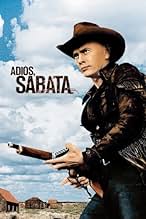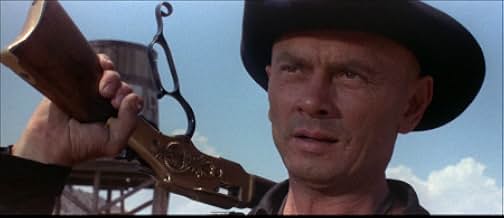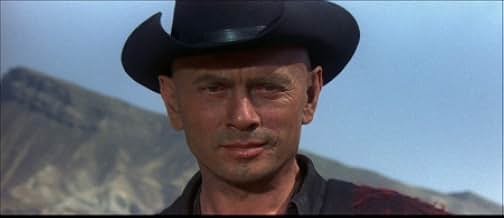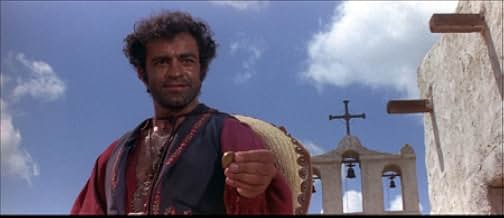IMDb रेटिंग
5.9/10
2.5 हज़ार
आपकी रेटिंग
अपनी भाषा में प्लॉट जोड़ेंSabata helps a band of Mexican revolutionaries steal a wagon-load of gold from the occupying Austrian forces of Emperor Maximilian I.Sabata helps a band of Mexican revolutionaries steal a wagon-load of gold from the occupying Austrian forces of Emperor Maximilian I.Sabata helps a band of Mexican revolutionaries steal a wagon-load of gold from the occupying Austrian forces of Emperor Maximilian I.
Ignazio Spalla
- Escudo
- (as Pedro Sanchez)
Gérard Herter
- Colonel Skimmel
- (as Gerard Herter)
Turam Quibo
- Gitano
- (as Joseph Persaud)
Nieves Navarro
- Kingsville Saloon Dancer
- (as Susan Scott)
Vittorio Caronia
- 1st Lt. Steiner
- (as Vitti Caronia)
फ़ीचर्ड समीक्षाएं
Yul Brynner and Dean (The Red Elvis) Reed team up with a group of Mexican revolutionaries in order to steal a shipment of gold belonging to the invading Austrian army and use it to buy guns for the resistance. However, the vicious Austrian occupiers have a few tricks up their sleeves and so does Brynner.
Yul's only real spaghetti western, his performance, flamboyant outfit, and neat gun-play elevates this very much typical, though well-made production to a higher level than it otherwise would have been. It's still too bland though.
The score by frequent Ennio Morricone collaborator Bruno Nicolai is pretty good.
From the producers and director of the earlier Sabata, this similarly themed film only became a sequel in the dubbing booth.
Yul's only real spaghetti western, his performance, flamboyant outfit, and neat gun-play elevates this very much typical, though well-made production to a higher level than it otherwise would have been. It's still too bland though.
The score by frequent Ennio Morricone collaborator Bruno Nicolai is pretty good.
From the producers and director of the earlier Sabata, this similarly themed film only became a sequel in the dubbing booth.
This is not really a Sabata film, but often Italian westerns pretended to be sequels just to get unwitting customers to come to see the films*. For example, Franco Nero's "Django" was very successful so practically every Italian film producer brought out a Django film but with a different leading man--and a completely different plot! Here, cashing in on the Sabata craze (small as it was), a non-Sabata film starring Yul Brynner is suddenly a Sabata film thanks to dubbing! In fact, originally, Brynner's character was called 'Indigo Black'. I checked and there were seven Sabata films--only two which are REAL Sabata films with Lee Van Cleef. The rest, like "Adios Sabata" are just rip-offs. So is this a BAD rip-off or a decent and watchable rip-off? Read on to see...
The plot of this film is close to that of a real Sabata film in that although he looks mean and shoots people by the score, this incarnation finds him doing this in order to help the Mexican Civil War of 1867. Now that doesn't mean he won't take a percentage for himself as well! A percentage of what you may ask....GOLD. It seems an evil (but very stylish) Austrian colonel is shipping gold--gold which could be used by the revolutionaries to buy weapons. However, Sabata isn't alone in this quest--he's taking along a fat guy, two VERY strange acrobats and a pretty-boy named Ballentine--who you KNOW is up to no good.
As far as Italian westerns go, this theme is VERY common--though most of the time the hero is helping the anti-Diaz forces of the Mexican Civil War of the 1910s. This one is set much earlier and has to do with getting rid of the imposed leader, Maximillian. Regardless, this one is reasonably entertaining, full of insanely good shots and has a touch of humor. Worth seeing but not a particularly novel film...except when it comes to one of the acrobats. His skill is handling a very large ball bearing kind of like a hacky sack--which he then hurls with his foot at people with deadly accuracy! Ha...worth seeing just to see this guy in action. ball bearing guy
*The same spirit of intellectual dishonesty was also rampant in Asian films after the death of Bruce Lee. Many supposedly new and recently discovered Lee films flooded the market--starring folks such as Bruce Li or consisting of home movies of Lee or outtakes from his films interspersed with a double wearing sunglasses! These films were ALL horrible--whereas a few of the Italian knockoffs were actually watchable. Plus, at least the Italian films had cool music.
The plot of this film is close to that of a real Sabata film in that although he looks mean and shoots people by the score, this incarnation finds him doing this in order to help the Mexican Civil War of 1867. Now that doesn't mean he won't take a percentage for himself as well! A percentage of what you may ask....GOLD. It seems an evil (but very stylish) Austrian colonel is shipping gold--gold which could be used by the revolutionaries to buy weapons. However, Sabata isn't alone in this quest--he's taking along a fat guy, two VERY strange acrobats and a pretty-boy named Ballentine--who you KNOW is up to no good.
As far as Italian westerns go, this theme is VERY common--though most of the time the hero is helping the anti-Diaz forces of the Mexican Civil War of the 1910s. This one is set much earlier and has to do with getting rid of the imposed leader, Maximillian. Regardless, this one is reasonably entertaining, full of insanely good shots and has a touch of humor. Worth seeing but not a particularly novel film...except when it comes to one of the acrobats. His skill is handling a very large ball bearing kind of like a hacky sack--which he then hurls with his foot at people with deadly accuracy! Ha...worth seeing just to see this guy in action. ball bearing guy
*The same spirit of intellectual dishonesty was also rampant in Asian films after the death of Bruce Lee. Many supposedly new and recently discovered Lee films flooded the market--starring folks such as Bruce Li or consisting of home movies of Lee or outtakes from his films interspersed with a double wearing sunglasses! These films were ALL horrible--whereas a few of the Italian knockoffs were actually watchable. Plus, at least the Italian films had cool music.
Firstly, this is *not* a sequel to 1970's "Sabata" ("Ehi amico... c'è Sabata, hai chiuso!") although it can be considered a follow up of sorts. Lee Van Cleef did not reprise the role until 1971's "Return of Sabata". "Adiós Sabata" was originally about a character called Indio Black and completely unrelated to the previous Sabata story - Indio, I believe, was meant to be nothing more than a bandit. The name was changed to cash in on the success of "Sabata" - though this film could be considered a true Sabata entry as a couple of stars return (Pedro Sanchez, Gianni Rizzo) and the screenwriters and director are the same. Gianfranco Parolini (Frank Kramer) perhaps out does the previous film here, keeping everything tighter - "Sabata" was a little too jokey (although still excellent and one of the truly great Italian westerns) whereas this is blatantly tongue in cheek. I feel the music is better in this film, never intrusive and always fitting: a triumph for Bruno Nicolai, despite the fact that it is incredibly reminiscent of Morricone.
As Sabata, Brynner is a kind of anti-hero counterpart to Chris from "The Magnificent Seven"; he even dresses out all in black here too. Gérard Herter is great as the Austrian Colonel Skimmel at the time of Emperor Maximillian's Mexico - a kind of borderline camp, Bond villain type, complete with monacle and perfectly trimmed moustache. Oh, and yes, he is a dead shot with a rifle. In "Sabata", Franco Ressel's Stengel had his shootout's behind man shaped shields (to live at the peak of danger or some such nonsense) as his playtoy; Herter's Skimmel has an even better one - a drawer beneath a model ship that when opened fires each cannon on the model directly into whoever opens the drawer. Like "The Good, the Bad and the Ugly" (which this film contains some surprisingly subtle references to) the plot centres around a shipment of gold: Sabata, Escudo (Sanchez) and Ballantine (Dean Reed) want the wagon load of gold, but it is also coveted by Maximillian's rebels. The scenes with the gold and the gold dust being poured out/spilled is nicely complimented by Nicolai's incidental music which really does bring out the joy of the characters.
I personally think it's a shame that Brynner and the others weren't brought back for another Sabata film because he plays the role much straighter than Van Cleef did and really does come across as a tough guy here, who doesn't need to rely on his gun. "Adiós Sabata" is a classic in it's own right and doesn't need to be viewed with the other Sabata entries. It's only downside is that after surpassing the superb original, it left most people disappointed with the later "Return of Sabata".
Are these subtle hints to Leone's 1966 masterpiece? Sanchez: "Me, I'd make a hiding place no-one would find - stick it in the ground, maybe in a cemetery..." Reed (the last line): "Hey fellas - are you gonna help me pick up the gold or not, you sons of...!" (music takes over)
As Sabata, Brynner is a kind of anti-hero counterpart to Chris from "The Magnificent Seven"; he even dresses out all in black here too. Gérard Herter is great as the Austrian Colonel Skimmel at the time of Emperor Maximillian's Mexico - a kind of borderline camp, Bond villain type, complete with monacle and perfectly trimmed moustache. Oh, and yes, he is a dead shot with a rifle. In "Sabata", Franco Ressel's Stengel had his shootout's behind man shaped shields (to live at the peak of danger or some such nonsense) as his playtoy; Herter's Skimmel has an even better one - a drawer beneath a model ship that when opened fires each cannon on the model directly into whoever opens the drawer. Like "The Good, the Bad and the Ugly" (which this film contains some surprisingly subtle references to) the plot centres around a shipment of gold: Sabata, Escudo (Sanchez) and Ballantine (Dean Reed) want the wagon load of gold, but it is also coveted by Maximillian's rebels. The scenes with the gold and the gold dust being poured out/spilled is nicely complimented by Nicolai's incidental music which really does bring out the joy of the characters.
I personally think it's a shame that Brynner and the others weren't brought back for another Sabata film because he plays the role much straighter than Van Cleef did and really does come across as a tough guy here, who doesn't need to rely on his gun. "Adiós Sabata" is a classic in it's own right and doesn't need to be viewed with the other Sabata entries. It's only downside is that after surpassing the superb original, it left most people disappointed with the later "Return of Sabata".
Are these subtle hints to Leone's 1966 masterpiece? Sanchez: "Me, I'd make a hiding place no-one would find - stick it in the ground, maybe in a cemetery..." Reed (the last line): "Hey fellas - are you gonna help me pick up the gold or not, you sons of...!" (music takes over)
Long before the Terminator, Sabata (this time Yul Brynner in his only spaghetti western) uttered the infamous words, "I'll be back." This is the second of Gianfranco Parolini's Sabata trilogy, but it is not a sequel, as the characters and story are different. Like the first, it is also written by Renato Izzo, who went on to write the video nasty Night Train Murders after finishing the trilogy.
Brynner had the cool look that probably got him the Westworld gig a few years later.
Ignazio Spalla is back from the fist film, but with a different name (Escudo). Maybe he changed it to hide.
Sabata joins Escudo and revolutionaries trying to overthrow Austrian Archduke Maximillion, who ruled over Mexico as an imperial dictator; of course, Sabata was only after gold. Others were as well, so it was not a walk in the park.
It is fortunate that the Archduke had plenty of soldiers to sacrifice to the cause.
Well, Lee Van Cleef, Ignazio Spalla, and Aldo Canti will be back in the final Sabata film.
Brynner had the cool look that probably got him the Westworld gig a few years later.
Ignazio Spalla is back from the fist film, but with a different name (Escudo). Maybe he changed it to hide.
Sabata joins Escudo and revolutionaries trying to overthrow Austrian Archduke Maximillion, who ruled over Mexico as an imperial dictator; of course, Sabata was only after gold. Others were as well, so it was not a walk in the park.
It is fortunate that the Archduke had plenty of soldiers to sacrifice to the cause.
Well, Lee Van Cleef, Ignazio Spalla, and Aldo Canti will be back in the final Sabata film.
Ok so it was supposed to be called INDIO BLACK as well as it should have been.
After all, Yul Brynner played the character far differently than Lee Van Cleef did and this film really shouldn't be associated with the other two Sabata films. It's a different character look altogether with the Brynner version dressed in black buckskin and silver buckles while the Van Cleef version of Sabata settled more for the conservative Bret Maverick gambler look.
Also notably stars failed American singer Dean Reed who would later die under mysterious circumstances in East Germany during the 1980s.
The Bruno Nicolai score is excellent although derivative of other scores for the genre. If you like soundtracks for these types of films, then it's well worth picking up. I know I'll be on the lookout for it.
Lots of explosions and gunfire in this one as Brynner & Co. battle the Austrians under Maximillian (in Mexico circa 1867) and steal their gold. There's nothing boring about it and it's face-paced with a few tricks such as the model of the ship in Colonel Skimmel's study that shoots real live ammo everytime someone opens the drawer below it. I also like Brynner's sawed-off rifle with the clip that loads from the side. He keeps a cigar in the last chamber and lights it up after every gun battle. Very tongue-in-cheek.
I liked it. Too bad the widescreen version was cropped for television.
6 out of 10
After all, Yul Brynner played the character far differently than Lee Van Cleef did and this film really shouldn't be associated with the other two Sabata films. It's a different character look altogether with the Brynner version dressed in black buckskin and silver buckles while the Van Cleef version of Sabata settled more for the conservative Bret Maverick gambler look.
Also notably stars failed American singer Dean Reed who would later die under mysterious circumstances in East Germany during the 1980s.
The Bruno Nicolai score is excellent although derivative of other scores for the genre. If you like soundtracks for these types of films, then it's well worth picking up. I know I'll be on the lookout for it.
Lots of explosions and gunfire in this one as Brynner & Co. battle the Austrians under Maximillian (in Mexico circa 1867) and steal their gold. There's nothing boring about it and it's face-paced with a few tricks such as the model of the ship in Colonel Skimmel's study that shoots real live ammo everytime someone opens the drawer below it. I also like Brynner's sawed-off rifle with the clip that loads from the side. He keeps a cigar in the last chamber and lights it up after every gun battle. Very tongue-in-cheek.
I liked it. Too bad the widescreen version was cropped for television.
6 out of 10
क्या आपको पता है
- ट्रिवियाThis was not originally a Sabata film. The original Italian title translates as "Indio Black, you know what? You're a big son of a...", Indio Black being the character played by Yul Brynner, but the title and Brynner's character name were changed for the American release to cash in on Ehi amico... c'è Sabata. Hai chiuso! (1969), the original Sabata film. Lee Van Cleef was asked to star in this film, but rejected the offer for some reason. He was then replaced by Brynner, whose character would only be called Sabata in the international English language version, and Indio Black in the Italian version. However, lip reading viewers have noticed that the actors who mouth their lines in English, seem to say "Sabata", not "Indio", so the re-baptism took place while the film was still being shot.
- गूफ़When Sabata invades Colonel Skimmel's quarters, he sees the reflection of a person hiding behind the door. The person in the reflection is not Hertz.
- कनेक्शनEdited into Spaghetti Western Trailer Show (2007)
टॉप पसंद
रेटिंग देने के लिए साइन-इन करें और वैयक्तिकृत सुझावों के लिए वॉचलिस्ट करें
- How long is Adiós, Sabata?Alexa द्वारा संचालित
विवरण
बॉक्स ऑफ़िस
- US और कनाडा में सकल
- $5,46,926
- चलने की अवधि1 घंटा 44 मिनट
- पक्ष अनुपात
- 2.35 : 1
इस पेज में योगदान दें
किसी बदलाव का सुझाव दें या अनुपलब्ध कॉन्टेंट जोड़ें

टॉप गैप
By what name was Indio Black, sai che ti dico: Sei un gran figlio di... (1970) officially released in India in English?
जवाब




























